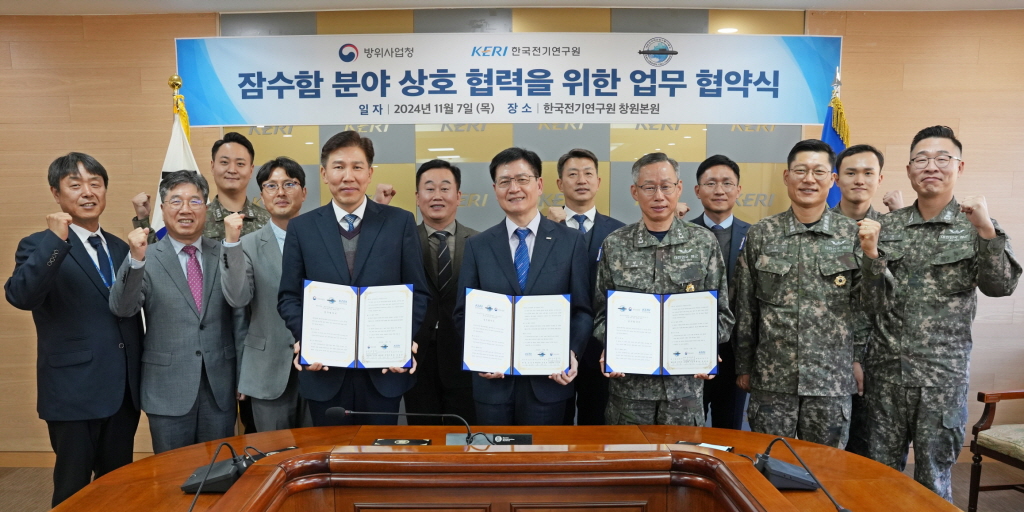한국전기연구원(KERI)이 방위사업청, 해군잠수함사령부와 잠수함 분야 협력을 위한 업무 협약을 체결하며, 잠수함 분야 국방 연구개발 활성화에 본격 나선다.

▲(앞줄 왼쪽부터)이상우 방위사업청 한국형잠수함사업단장, 김남균 한국전기연구원장, 강정호 해군잠수함사령관과 관계자들이 MOU 체결 후 기념촬영을 하고 있다.
방사청·해군잠수함사령부와 업무협약 체결
한국전기연구원(KERI)이 잠수함 분야 국방 연구개발 활성화에 본격 나선다.
전기연구원은 7일 창원본원에서 방위사업청, 해군잠수함사령부와 잠수함 분야 협력을 위한 업무 협약을 체결했다.
이번 협약을 통해 3개 기관은 △잠수함 분야 첨단기술 적용 및 발전, 국산화를 위한 연구개발 활성화 △잠수함 분야 지식 정보 교류 및 기술적 자문 협조 △기관별 상호 방문 및 교육, 기술 교류 확대 등에 협력하기로 협의했다.
최근 전기차에 이어 해양 분야에서도 전기추진 선박이 많은 주목을 받고 있다.
전기추진 시스템은 기계식 추진 장치 없이 배터리에 저장된 전력이나 발전기로부터 공급된 전력을 이용하여 추진 모터를 구동하는 방식이다.
수중에서 엔진을 활용하지 않고 추진해야 하는 잠수함은 오래 전부터 전기추진 시스템을 사용해 오고 있었고, 이를 통해 수중방사 소음을 최소화하여 생존성을 확보해 왔다.
KERI는 이러한 잠수함 등 전기추진 선박을 육상에서 시험하는 ‘LBTS(Land Based Test Site)’를 지난 2015년에 국내 최초 그리고 세계 3번째(미국-영국-한국)로 구축하여 10여 년간 성공적으로 운영해 왔다.
이 과정에서 국내 최초로 독자 설계·건조한 3천t급 잠수함인 ‘도산 안창호함(장보고-Ⅲ급)’ 시험을 진행해 건조기간 단축 및 비용 절감 효과를 이끌어 낸 바 있으며, 현재는 장보고-III Batch-II 리튬전지체계 성능검증 및 체계통합 등을 수행하고 있다. 이를 통해 경남 창원시가 해양 방위산업의 중심이 되는 데 큰 역할을 해오기도 했다.
KERI 김남균 원장은 “3개 기관 협력을 통해 잠수함 분야 기술력을 크게 높이고, 대한민국이 해양 방위산업을 주도하는 데 큰 역할을 할 수 있도록 노력하겠다”고 밝혔다.
한편 KERI는 과학기술정보통신부 국가과학기술연구회 산하 정부출연연구기관이다.